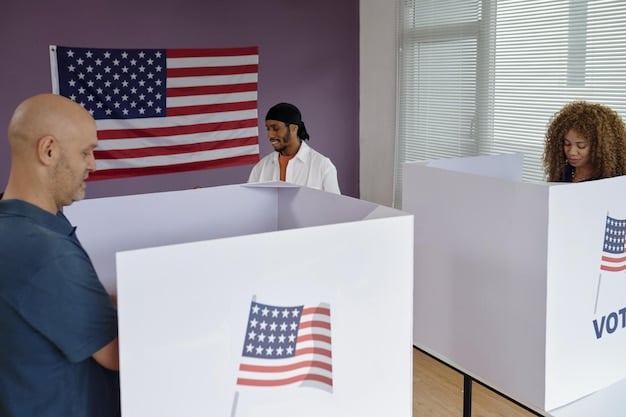Political Scandals: Do They Impact Voter Turnout in the US?

The impact of political scandals on voter turnout is complex, ranging from increased outrage and participation to widespread apathy and disengagement, influenced by scandal severity, media coverage, and pre-existing political attitudes.
Political scandals are a recurring feature of the political landscape, creating headlines and fueling public discourse. A crucial and often debated question is: What is the impact of political scandals on voter turnout: apathy or outrage?
Understanding Political Scandals and Public Perception
Political scandals can take various forms, from financial corruption and abuse of power to personal misconduct and ethical lapses. Understanding how these different types of scandals affect public perception is crucial for evaluating their impact on voter turnout.
Types of Political Scandals
Political scandals are not monolithic; they encompass a wide range of behaviors and wrongdoings. Here are some common types:
- Financial Corruption: Involves illegal use of public funds, bribery, and embezzlement.
- Abuse of Power: Includes using official authority for personal gain or to suppress dissent.
- Personal Misconduct: Encompasses affairs, moral failings, and other behaviors that contradict public expectations.
- Ethical Lapses: Covers conflicts of interest, improper lobbying, and actions that violate ethical standards.
Each type of scandal can trigger different reactions from the public, influencing whether voters feel outraged, disillusioned, or apathetic. The specifics of a scandal often determine its ability to mobilize or demobilize voters.

The Role of Media in Shaping Public Opinion
Media coverage plays a pivotal role in shaping public perception of political scandals. The way a scandal is framed, the amount of attention it receives, and the tone of the reporting can all influence how voters react.
- Framing: Media outlets choose which aspects of a scandal to emphasize, influencing how the public interprets the events.
- Attention: Scandals that receive extensive coverage are more likely to impact public opinion and voter behavior.
- Tone: Whether reporting is critical, neutral, or supportive can shape voters’ perceptions of the severity and implications of the scandal.
The media’s ability to amplify or downplay scandals can significantly alter their impact on voter turnout. Objective and thorough reporting is critical for enabling voters to make informed decisions.
In conclusion, understanding the diverse nature of political scandals and the media’s role in shaping public opinion is essential for assessing how these events affect voter participation. The nuances of scandal type, coverage, and public perception create a complex interplay that can either spur voters to action or drive them away from the polls.
Outrage as a Motivator: Scandals That Boost Voter Turnout
Some political scandals can ignite public outrage, leading to increased voter turnout as citizens seek to express their disapproval. Scandals that involve corruption, abuse of power, or betrayal of public trust often motivate voters to participate actively in elections.
Instances of Increased Turnout After Scandals
Several historical and contemporary examples illustrate how scandals can mobilize voters. These instances often involve high-profile cases that capture significant media attention and resonate deeply with the public.
- Watergate Scandal (1972-1974): The Watergate scandal, involving President Richard Nixon’s administration, led to increased voter turnout in the 1974 midterm elections as voters sought to hold the Republican Party accountable.
- Iran-Contra Affair (1985-1987): The revelation of the Reagan administration’s secret arms sales to Iran in exchange for the release of American hostages spurred increased voter engagement in subsequent elections.
- Recent Political Scandals: Scandals involving financial corruption or ethical breaches can also drive turnout, particularly when they affect local communities directly.
These examples highlight that when a scandal is perceived as a significant threat to democratic values or public integrity, it can galvanize voters to participate actively in elections.
The Role of Social Media and Grassroots Activism
Social media and grassroots activism play a crucial role in amplifying public outrage and mobilizing voters in response to political scandals. These platforms enable citizens to organize, share information, and coordinate collective action.
- Social Media: Platforms like Twitter, Facebook, and Instagram allow for rapid dissemination of information and the formation of online communities centered around political issues.
- Grassroots Movements: Organized efforts by citizen groups to raise awareness, protest, and advocate for policy changes can significantly impact voter turnout.
- Online Campaigns: Digital tools are used to organize voter registration drives, disseminate information about candidates, and encourage participation in elections.
The ability of social media to amplify outrage and the organizational power of grassroots movements can transform public sentiment into tangible electoral outcomes.

In summary, scandals that evoke strong public outrage can serve as catalysts for increased voter turnout. The combination of high-profile cases, media attention, social media engagement, and grassroots activism can mobilize citizens to express their disapproval at the ballot box, holding those in power accountable for their actions.
Apathy as a Consequence: When Scandals Depress Voter Turnout
While some scandals can motivate voters to participate, others may induce apathy, leading to decreased voter turnout. Scandals that are perceived as too frequent, complex, or systemic can leave voters feeling disillusioned and powerless.
The Impact of Scandal Fatigue and Cynicism
The constant barrage of political scandals can lead to scandal fatigue and cynicism, discouraging voters from participating in elections. When scandals become commonplace, citizens may become desensitized and lose faith in the political process.
- Scandal Fatigue: Overexposure to scandals can diminish their impact, making voters less responsive to each new revelation.
- Cynicism: A belief that all politicians are corrupt or that the system is rigged can lead to disengagement and a reluctance to participate in elections.
- Distrust: Scandals can erode trust in government institutions and elected officials, further contributing to voter apathy.
These factors can collectively depress voter turnout as citizens lose நம்பிக்கை in the ability of their participation to effect meaningful change.
Demographic Differences in Reaction to Scandals
Different demographic groups may react differently to political scandals, with some segments of the population being more prone to apathy than others. Understanding these differences is essential for projecting the potential impact of scandals on voter turnout.
- Young Voters: Young people may be particularly susceptible to disillusionment if they perceive politics as inherently corrupt or ineffective.
- Marginalized Communities: Communities that have historically faced systemic discrimination may feel that their voices are not heard, leading to lower participation rates.
- Older Voters: Older voters may be more likely to feel that scandals are a normal part of politics and less likely to be deterred from voting.
Accounting for these demographic variations can provide a more nuanced understanding of how scandals impact voter turnout across different segments of society.
In conclusion, while some scandals can galvanize voters, others may lead to apathy and decreased voter turnout. Scandal fatigue, cynicism, and demographic differences in reaction to scandals can all contribute to this phenomenon. Understanding these dynamics is crucial for assessing the overall impact of political scandals on democratic participation.
The Role of Political Polarization
Political polarization significantly influences how voters perceive and react to political scandals. Partisan alignment can shape how voters interpret the severity and implications of a scandal, potentially leading to biased evaluations and differing effects on voter turnout.
How Polarization Shapes Scandal Perception
Political polarization creates echo chambers where individuals primarily consume information that confirms their existing beliefs. This can lead to skewed perceptions of political scandals, with voters often downplaying or dismissing scandals involving their own party while exaggerating those involving the opposing party.
- Partisan Bias: Individuals may be more critical of scandals involving the opposing party and more forgiving of scandals involving their own party.
- Selective Exposure: Voters tend to seek out media sources that align with their political views, reinforcing existing biases and shaping their understanding of scandals.
- Source Credibility: Trust in media outlets and political figures can vary widely depending on partisan affiliation, influencing how voters perceive the validity of scandal-related information.
These factors contribute to a polarized environment where objective evaluation of political scandals is often compromised by partisan allegiance.
The Impact on Turnout Among Different Party Affiliations
Polarization can lead to differing effects on voter turnout among different party affiliations. Scandals involving one party may motivate supporters of the opposing party to turn out in greater numbers, while potentially demoralizing supporters of the party implicated in the scandal.
- Increased Opposition Turnout: Scandals can serve as rallying cries for the opposing party, boosting voter turnout and galvanizing support for alternative candidates.
- Demoralization of Supporters: Supporters of the party involved in the scandal may feel disillusioned or embarrassed, leading to decreased participation in elections.
- Independent Voters: Independent voters may be swayed by scandals to support one party over another, potentially influencing electoral outcomes.
Understanding these dynamics is essential for assessing the potential impact of political scandals on overall voter turnout patterns.
In summary, political polarization plays a significant role in shaping how voters perceive and react to political scandals. Partisan bias, selective exposure, and source credibility all contribute to a polarized environment where objective evaluation is often compromised. The impact on turnout can vary among different party affiliations, with scandals potentially mobilizing opposition voters while demoralizing supporters of the party involved.
Long-Term Effects: Scandals and Declining Trust in Government
The long-term effects of political scandals extend beyond immediate voter turnout, influencing public trust in government and democratic institutions. Repeated scandals can erode citizen confidence and contribute to a broader sense of political disengagement.
Erosion of Trust in Institutions
Political scandals can significantly erode public trust in government institutions, including the executive, legislative, and judicial branches. When elected officials and government employees are implicated in wrongdoings, it can lead to a perception that the system is corrupt and unaccountable.
- Executive Branch: Scandals involving presidents or their administrations can undermine public confidence in the executive branch’s ability to govern effectively and ethically.
- Legislative Branch: Scandals involving members of Congress can create a perception that lawmakers are more interested in personal gain than serving the public interest.
- Judicial Branch: Scandals involving judges can erode trust in the impartiality and integrity of the justice system.
The erosion of trust in these institutions can have far-reaching consequences, including decreased compliance with laws, reduced civic engagement, and a greater willingness to consider alternative political systems.
Impact on Future Elections and Political Engagement
The long-term effects of political scandals can extend to future elections and overall political engagement. Citizens who have lost trust in government may become less likely to vote, volunteer for campaigns, or participate in other forms of civic action.
- Decreased Voter Turnout: A persistent lack of trust in government can lead to chronic voter apathy, particularly among young and marginalized communities.
- Reduced Campaign Involvement: Citizens who distrust politicians may be less willing to donate to campaigns, volunteer their time, or engage in political advocacy.
- Increased Political Disengagement: Scandals can contribute to a broader sense of political disengagement, with citizens feeling that their voices are not heard and that their participation makes little difference.
Addressing these long-term effects requires restoring trust in government through transparency, accountability, and ethical leadership.
In summary, political scandals can have significant long-term effects on public trust in government and democratic institutions. The erosion of trust can lead to decreased voter turnout, reduced campaign involvement, and increased political disengagement. Restoring trust requires a commitment to transparency, accountability, and ethical leadership, as well as efforts to address the underlying causes of political corruption and misconduct.
Case Studies: Analyzing Specific Scandals and Their Effects
A detailed analysis of specific political scandals can provide valuable insights into the varying effects on voter turnout. By examining the unique circumstances, public reactions, and electoral outcomes associated with different scandals, it is possible to better understand the complex relationship between scandal and voter participation.
Watergate Scandal: A Turning Point in American Politics
The Watergate scandal, involving President Richard Nixon’s administration, is one of the most significant political scandals in American history. An analysis of Watergate can illuminate the effects of high-profile scandals on voter turnout and public trust.
- Background: The Watergate scandal began with a break-in at the Democratic National Committee headquarters in the Watergate Hotel in 1972 and eventually implicated President Nixon in a cover-up.
- Public Reaction: The scandal led to widespread public outrage and calls for Nixon’s impeachment. Media coverage was extensive, and public trust in the government plummeted.
- Electoral Outcomes: The 1974 midterm elections saw a significant increase in voter turnout, with Democrats gaining seats in Congress. The scandal contributed to a broader sense of political cynicism and a demand for greater accountability.
The Impact of Local Scandals on Community Elections
Analyzing local scandals can provide insights into how these events affect voter turnout at the community level. Local scandals often involve issues that directly impact residents, such as corruption, zoning disputes, or mismanagement of public funds.
- Case Example: A hypothetical case might involve a city council member in a small town who is accused of accepting bribes from developers in exchange for favorable zoning decisions.
- Public Reaction: The scandal leads to community outrage, with residents organizing protests and demanding the resignation of the council member.
- Electoral Outcomes: Voter turnout in the next local election increases significantly, with a focus on candidates who promise to clean up corruption and restore integrity to local government.
In conclusion, case studies provide tangible examples of how political scandals can impact voter turnout and electoral outcomes. High-profile scandals can lead to increased turnout as voters seek to hold those in power accountable, while local scandals can mobilize communities to demand change at the grassroots level.
| Key Point | Brief Description |
|---|---|
| 🔥 Outrage & Turnout | Scandals can spark anger, boosting voter participation. |
| 😔 Apathy & Abstention | Frequent scandals can lead to voter disengagement. |
| 📰 Media’s Role | Media coverage shapes public perception drastically. |
| 🏛️ Trust Erosion | Scandals damage trust in government & institutions. |
Frequently Asked Questions
▼
Not necessarily. While some scandals incite outrage and boost voter turnout, others can lead to apathy, decreasing participation. It depends on the scandal’s nature and the public’s perception.
▼
Media coverage significantly shapes public perception. The framing, attention given, and tone of reporting can influence how voters interpret the scandal and react accordingly.
▼
Social media amplifies outrage and mobilizes voters. It enables rapid information dissemination, community formation, and coordinated action, influencing electoral outcomes significantly.
▼
Yes, polarization skews perceptions. Voters often downplay scandals involving their party while exaggerating those of opponents, leading to biased evaluations and varied effects on turnout.
▼
Scandals erode trust in institutions, lower civic engagement, and promote political disengagement. Restoring trust requires transparency, accountability, and ethical leadership over time.
Conclusion
In conclusion, the impact of political scandals on voter turnout: apathy or outrage? is a complex interplay of factors, influenced by the nature of the scandal, media coverage, political polarization, and public perception. Understanding these dynamics is crucial for assessing their overall impact on democratic participation.





